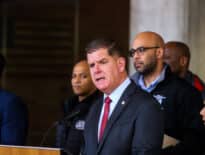After another month of faring better financially than budgeted, the MBTA has set aside nearly $71 million in savings since the start of fiscal year 2021, though officials continue to stick to their plan to cut service on underused lines and consider restoring it later this year.
The T, which shuttered weekend service on several commuter rail lines and trips on the Charlestown and Hingham ferries starting Saturday, finished November with net revenues of $14.3 million compared to an expected monthly bottom line of negative $5.2 million, General Manager Steve Poftak said. That performance was driven by a combination of decreased spending and better-than-expected sales tax revenue collections, Poftak said.
The surplus revenue will be deposited into a fund the agency created as a bulwark against a massive, pandemic-fueled budget crunch, pushing its balance to $70.8 million. The T will not use that money immediately and will hold it aside until the next fiscal year.
If the rest of fiscal year 2021 plays out as budgeted, the agency will end the spending cycle with $314 million set aside in its temporary savings fund that could get deployed to address an fiscal 2022 budget gap, reverse cuts to bus, rail and ferry service, or effectuate a combination of the two.
Officials at the transit agency had previously aimed to end fiscal 2021 with between $236 million and $276 million in the deficiency savings bucket to help soften any blow in the next year if ridership is slow to return.
“Right now, if we go according to budget, we’ll end up with $314 million available to restore service and fund other operational expenses in [fiscal 2022],” Poftak said.
Like many transit agencies, the MBTA has been grappling with a budget crisis inflicted by reduced ridership and fare revenues amid the pandemic. The MBTA Board approved a package of service cuts in December aimed at cutting spending while ridership, still hovering below a third of pre-pandemic levels, is low.
The agency will receive at least $250 million in federal funding from the latest stimulus package, and as much as $17 million of that will go toward short-term service restorations. Another $178 million will replenish capital funds that were transferred to cover a shortfall, and the rest will be saved until officials decide service levels in the fiscal 2022 budget.
Many lawmakers and advocates have voiced frustration with the T’s budgeting approach, arguing that the smaller number of riders still using the system amid a pandemic depend on it the most and are harmed by the changes.







